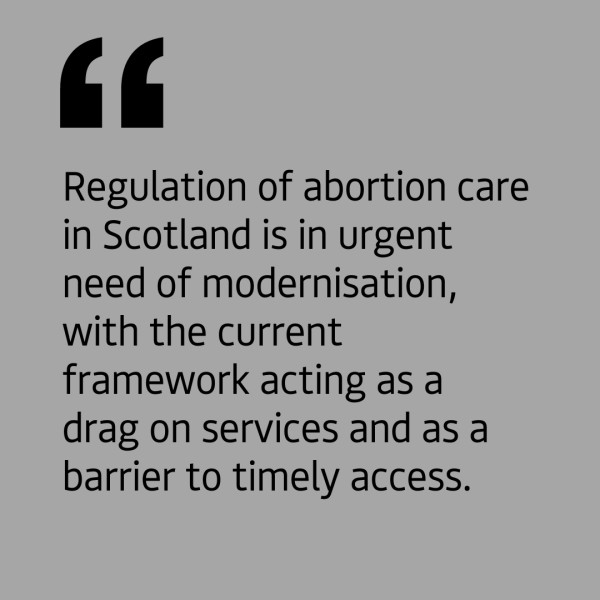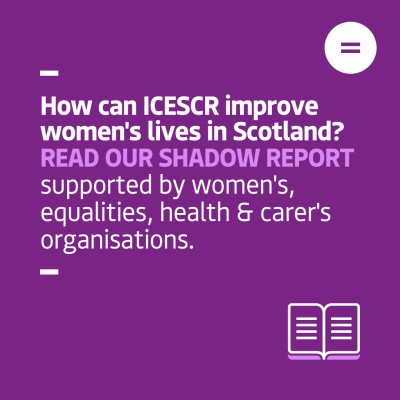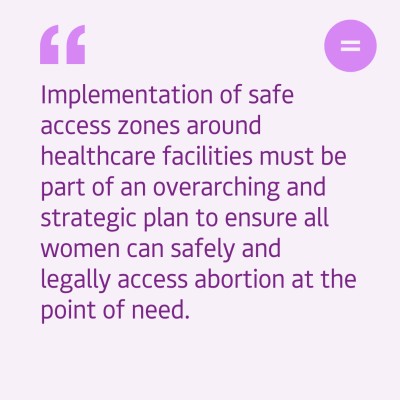Engender blog
Making the case for decriminalising abortion
The campaign to decriminalise abortion has gained momentum in recent months, and Engender has continued to advocate for change. We've pulled together a quick rundown of our recent work on this issue and the need for progress.

The Background
In England, women have been prosecuted and sentenced for procuring their own abortions, attracting media attention and leading to protests and other activities by advocates for reform.
Regulation of abortion care in Scotland is in urgent need of modernisation, with the current framework acting as a drag on services and as a barrier to timely access. The Scottish Government’s recent commitment to bring forward proposals to decriminalise abortion by the end of the parliamentary term (2026) has come on the back of increased scrutiny, policy and advocacy efforts by a range of stakeholders.
Why?
Abortion healthcare is vital to women's equality and wellbeing. It is a routine reproductive health procedure, with around one in three women needing an abortion in their lifetime in the UK.
Like most Scots, Engender supports women to make decisions about ending or continuing a pregnancy, and we’ve long called for change to ensure women’s reproductive rights are fully realised. Unfortunately, the current legal and regulatory regime means that women can be criminalised for procuring abortions, that two doctors need to authorise a woman’s decision to terminate a pregnancy, and that this impacts treatment such that it does not always best meet women's needs.
What have we done so far?
Last September, we joined Abortion Rights Scotland to hold a webinar session on decriminalisation, which set out key arguments in terms of women’s equality, the perspective of clinicians, and the legal status quo. You can watch the webinar online here. Our submission in response to a public petition to decriminalise abortion, alongside other evidence gathered by the Petitions Committee earlier this year, highlights key arguments for decriminalisation and urges the Committee to seek further and fuller evidence following this petition.
Earlier this month, Engender joined with eight other organisations - focused on women’s equality, abortion rights and health - to discuss the Scottish Government’s recent commitments with the Minister for Public Health and Women’s Health, Jenni Minto MSP. This followed a collective letter to the then-newly appointed First Minister in June, which was co-signed by 18 organisations, expressing our support for his commitment to remove abortion from the criminal justice system, and calling for an expert working group to support the development of proposals.
An expert working group
September’s Programme for Government contained a commitment to review of the current legal framework, and our call to create an expert working group has been accepted. The meeting with the Minister was a welcome opportunity to discuss this work, and to highlight the need for reform in terms of impacts on service provision and intersectional women’s equality and the importance of drawing on different women’s experiences of accessing abortion care.
What's next?
In terms of next steps, we focused on the need to act swiftly on establishing the review if we are going to see real progress by 2026, alongside transparent and established resourcing. We highlighted unintended consequences that have arisen internationally when reforming abortion law, with regards to access to services, and how this emphasises the need for lived experience input from different groups, alongside a broader focus on what the new regime will look like on the ground for women. Linked to this, we want to see the process rooted in established international human rights standards and norms, which make clear that abortion has no place in criminal law.
At Engender, we will be publishing a paper looking in detail at abortion within Scots law and different approaches that could be taken to achieve decriminalisation and a better service for women in Scotland. Please keep a look out for this and work around this important issue across Scotland in the months ahead.
How can ICESCR impact women's human rights in Scotland?

Engender recently joined with women's, equalities, health and carer's organisations to submit our shadow report to the Seventh periodic report of the government of the United Kingdom on measures taken to give effect to ICESCR. In this blog, we take a look at our submission and how ICESCR can be a key tool for improving women's lives in Scotland.
For many years, Engender and other women’s equality advocates have been campaigning for the incorporation of the UN Convention on the Elimination of all forms of Discrimination Against Women (often known as the ‘women’s bill of rights’) into Scots Law, but CEDAW isn’t the only UN Convention which is essential when it comes to the protection of women’s equality and rights. The International Covenant on Economic, Social and Cultural Rights (ICESCR), which ensures the enjoyment of economic, social and cultural rights, was adopted in 1966.
A statement from Scottish civil society organisations on the UK Government’s intervention on the Gender Recognition Reform (Scotland) Bill
This week, the UK government announced their intention to block the Gender Recognition Reform (Scotland) Bill, which was recently passed overwhelmingly in the Scottish Parliament, from becoming law. We, the undersigned, wish to make clear our strong opposition to this intervention and to any suggestion that these reforms would have an adverse effect on the Equality Act or women’s rights.
Safe access to abortion services in Scotland

Engender recently submitted a response to the consultation on the proposed Abortion Services (Safe Access Zones) (Scotland) Bill. We’ve given a brief rundown of key points in this blog. You can access the full submission here, which covers the specific questions raised in the consultation around implementation of safe access zones locally and nationally, the size of potential safe access zones, the effect of current protests on women and staff, as well as the impact on human rights and other measures needed to improve abortion services in Scotland.
Everyone deserves to access reproductive healthcare free from abuse and harassment. Unfortunately, today in Scotland we still see women, and others accessing pregnancy and abortion services, targeted by those who do not believe in bodily autonomy or our right to choose. Following recent activism from organisations and campaigns including Back Off Scotland and others, Scotland is now making progress towards establishing safe access zones (also known as ‘buffer zones’) to enable people to access services in safety.
Exploring legislation on buffer zones in Northern Ireland
-400.png)
We're pleased to be working with student Beatriz Morganti Brandão to research how the International Covenant on Economic, Social and Cultural Rights can be used to protect women in Scotland. In this blog post, she explores the upcoming UK Supreme Court decision on buffer zones in Northern Ireland and how it could impact on women’s rights in Scotland.
A hot topic in Scotland today is the regulation of ‘buffer zones’ (protest-free areas) outside abortion clinics. These zones aim to protect women seeking and providing abortion services from escalating harassment and intimidation by anti-choice protestors. Gillian Mackay MSP has recently launched a consultation on a project to legislate on buffer zones around clinics in Scotland. The consultation is open until 11th August and we encourage all those wishing to improve women’s rights in Scotland to contribute. You can fill in the consultation online here.
Downloads
 Engender Briefing: Pension Credit Entitlement Changes
From 15 May 2019, new changes will be introduced which will require couples where one partner has reached state pension age and one has not (‘mixed age couples’) to claim universal credit (UC) instead of Pension Credit.
Engender Briefing: Pension Credit Entitlement Changes
From 15 May 2019, new changes will be introduced which will require couples where one partner has reached state pension age and one has not (‘mixed age couples’) to claim universal credit (UC) instead of Pension Credit.
 Engender Parliamentary Briefing: Condemnation of Misogyny, Racism, Harassment and Sexism
Engender welcomes this Scottish Parliament Debate on Condemnation of Misogyny, Racism, Harassment and Sexism and the opportunity to raise awareness of the ways in which women in Scotland’s inequality contributes to gender-based violence.
Engender Parliamentary Briefing: Condemnation of Misogyny, Racism, Harassment and Sexism
Engender welcomes this Scottish Parliament Debate on Condemnation of Misogyny, Racism, Harassment and Sexism and the opportunity to raise awareness of the ways in which women in Scotland’s inequality contributes to gender-based violence.
 Gender Matters in Social Security: Individual Payments of Universal Credit
A paper calling on the Scottish Government to automatically split payments of Universal Credit between couples, once this power is devolved to the Scottish Parliament.
Gender Matters in Social Security: Individual Payments of Universal Credit
A paper calling on the Scottish Government to automatically split payments of Universal Credit between couples, once this power is devolved to the Scottish Parliament.
 Gender Matters Manifesto: Twenty for 2016
This manifesto sets out measures that, with political will, can be taken over the next parliamentary term in pursuit of these goals.
Gender Matters Manifesto: Twenty for 2016
This manifesto sets out measures that, with political will, can be taken over the next parliamentary term in pursuit of these goals.
 Scottish NGO Briefing for UN Special Rapporteur on Violence Against Women
Joint briefing paper for the UN Rapporteur on Violence Against Women.
Scottish NGO Briefing for UN Special Rapporteur on Violence Against Women
Joint briefing paper for the UN Rapporteur on Violence Against Women.

Newsletter
Sign up to receive our newsletter here:
Sign up to our mailing list
Receive key feminist updates direct to your inbox: